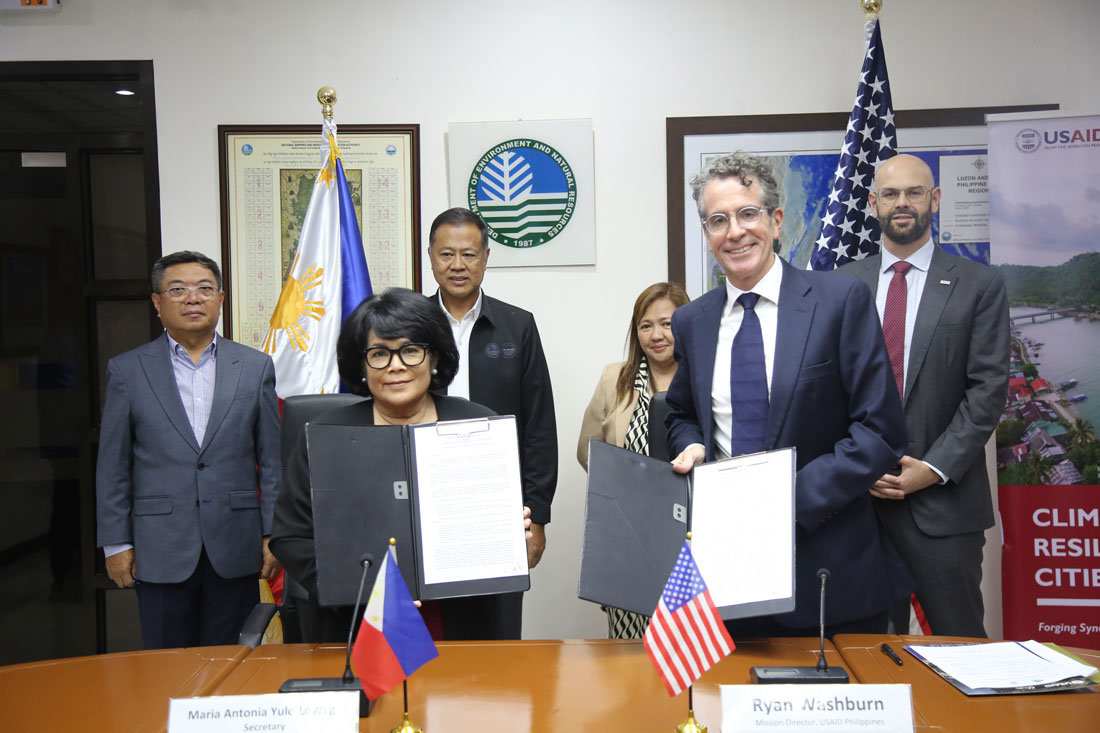
The United States Agency for International Development (USAID), and the Department of Environment and Natural Resources (DENR) signed a Memorandum of Understanding (MOU) to implement a project aimed at enhancing the adaptive capacity of key cities in the Philippines to climate change impacts.
The MOU for the Climate Resilient Cities project was signed by DENR Secretary Maria Antonia Yulo Loyzaga and USAID Mission Director Ryan Washburn. The five-year, PHP836.5 million (USD15 million) project will help enable the cities of Batangas, Borongan, Cotabato, Iloilo, Legazpi, and Zamboanga adapt to, mitigate and endure the impacts of climate change through knowledge-enhancement and improving access to climate change financing.
“The United States has long been the Philippines’ enduring friend, partner, and ally in addressing the impacts of climate change. As the Philippines prepares to launch its National Climate Adaptation Plan at COP 28 (2023 Climate Change Conference), USAID is working alongside climate-vulnerable cities in the country to become more resilient to these challenges. Through this project, the US government is helping local governments and other stakeholders better understand, use and disseminate climate information to communities,” said Ryan Washburn.
USAID is working with the Catholic Relief Services, as well as its other implementing partners that include the Philippine Disaster Resilience Foundation and Conservation International. DENR will monitor and provide oversight to the implementation of the project, ensuring that outcomes focused on the use of climate data in local climate change planning, accessing climate finance, and implementing nature-based solutions are aligned with the Philippine climate change agenda. Through the project, DENR and USAID will work towards capacity-building and development programs in partner cities and facilitate workshops and conferences, reform national or local level policies related to climate change and nature-based solutions, organize events, and promote information materials and knowledge products.
“As cities increase in number and size, it underscores the need to enhance resilience capacities to withstand climate-related shocks and stresses. The specific interest of DENR is to enhance anticipatory action, which can be aided by the purpose of this project which is to allow technical capacity to be built in local government units to understand climate data and analysis at a granularity that they can actually use to take focused and direct action,” said DENR Secretary Maria Antonia Yulo Loyzaga.
The US government has been a key development partner of the Philippines for the past 60 years, working with individuals, communities, and the government to improve lives. The Climate Resilient Cities project with contribution from the Korea International Cooperation Agency, supports the Philippine government’s agenda on climate change action and resiliency, as well as the US government’s goal of addressing this global crisis by working with its partners to achieve key targets: (1) reduce greenhouse gas emissions and help partners build resilience; (2) conserve 100 million hectares of critical landscapes; and (3) support 500 million people worldwide to prepare and adapt to climate change.###












